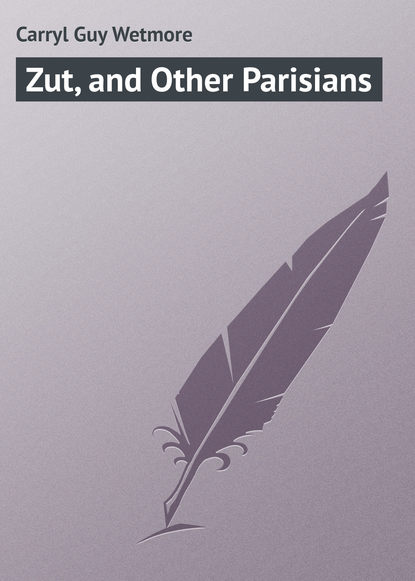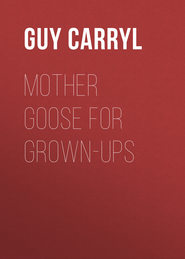По всем вопросам обращайтесь на: info@litportal.ru
(©) 2003-2024.
✖
Zut, and Other Parisians
Настройки чтения
Размер шрифта
Высота строк
Поля
For what is also true of the Quartier is this – that, in sunshine or shadow, one finds a soft little hand clasping his, firm, warm, encouraging and kindly, and hears a gay little voice that, in foul weather, chatters of the bright hours which it is so sweet to remember, and, in fair, says never a word of the storms which it is so easy to forget!
The veriest bat might have foreseen the end, when once Mimi had put her arm around the neck of Caffiard. Before the deus ex machina knew what he was about, he found his army of objections routed, horse, foot, and dragoons, and had promised to be at the gare St. Lazare at eleven the following morning.
And what a morning it was! Surely the bon Dieu must have loved Mimi an atom better than other mortals, for in the blue-black crucible of the night he fashioned a day as clear and glowing as a great jewel, and set it, blazing with warm light and vivid color, foremost in the diadem of the year. And it was something to see Mimi at the carriage window, with Pierre at her side and her left hand in his, and in her right a huge bouquet – Caffiard's contribution – while the deus ex machina himself, breathing like a happy hippopotamus, beamed upon the pair from the opposite corner. So the train slipped past the fortifications, swung through a trim suburb, slid smoothly out into the open country. It was a Wednesday, and there was no holiday crowd to incommode them. They had the compartment to themselves; and the half hour flew like six minutes, said Mimi, when at last they came to a shuddering standstill, and two guards hastened along the platform in opposite directions, one droning "Poiss-y-y-y-y!" and the other shouting "Poiss'! Poiss'! Poiss'!" as if he had been sneezing. It was an undertaking to get Caffiard out of the carriage, just as it had been to get him in. But finally it was accomplished, a whistle trilled from somewhere as if it had been a bird, another wailed like a stepped-on kitten, the locomotive squealed triumphantly, and the next minute the trio were alone in their glory.
It was a day that Caffiard never forgot. They breakfasted at once, so as to have a longer afternoon. Mimi was guide and commander-in-chief, as having been to the Esturgeon before, so the table was set upon the terrasse overlooking the Seine, and there were radishes, and little individual omelettes, and a famous matelote, which Monsieur Jarry himself served with the air of a Lucullus, and, finally, a great dish of quatre saisons, and, for each of the party, a squat brown pot of fresh cream. And, moreover, no ordinaire, but St. Emilion, if you please, with a tin-foil cap which had to be removed before one could draw the cork, and a bottle of Source Badoit as well. And Caffiard, who had dined with the Russian Ambassador on Monday and breakfasted with the Nuncio on Tuesday, and been egregiously displeased with the fare in both instances, consumed an unprecedented quantity of matelote, and went back to radishes after he had eaten his strawberries and cream: while, to cap the climax, Pierre paid the addition with a louis, – and gave all the change as a tip! But it was unheard-of!
Afterwards they engaged a boat, and, with much alarm on the part of Mimi, and satirical comment from Caffiard, and severe admonitions to prudence by Pierre, pushed out into the stream and headed for Villennes, to the enormous edification of three small boys, who hung precariously over the railing of the terrace above them, and called Caffiard a captive balloon.
They made the three kilometres at a snail's pace, allowing the boat to drift with the current for an hour at a time, and, now and again creeping in under the willows at the water's edge until they were wholly hidden from view, and the voice of Mimi singing was as that of some river nixie invisible to mortal eyes. She sang "Bonsoir, Madame la Lune," so sweetly and so sadly that Caffiard was moved to tears. It was her favorite song, because – oh, because it was about Pierrot! And her own Pierrot responded with a gay soldier ballad, a chanson de route which he had picked up at the Noctambules; and even Caffiard sang – a ridiculous ditty it was, which scored the English and went to a rollicking air. They all shouted the refrain, convulsed with merriment at the drollery of the sound: —
"Qu'est ce qui quitte ses père et mère
Afin de s'en aller
S'faire taper dans le nez?
C'est le soldat d'Angleterre!
Dou-gle-di-gle-dum!
Avec les ba-a-a-alles dum-dum!"
Caffiard was to leave them at Villennes after they should have taken their apéritifs. They protested, stormed at him, scolded and cajoled by turns, and called him a score of fantastic names – for by this time they knew him intimately – as they sat in Monsieur Bodin's arbor and sipped amer-menthe, but all in vain. Pierre had Mimi's hand, as always, and he had kissed her a half-hundred times in the course of the afternoon. Mimi had a way of shaking her hair out of her eyes with a curious little backward jerk of her head when Pierre kissed her, and then looking at him seriously, seriously, but smiling when he caught her at it. Caffiard liked that. And Pierre had a trick of turning, as if to ask Mimi's opinion, or divine even her unspoken wishes whenever a question came up for decision – a choice of food or drink, or direction, or what-not. And Caffiard liked that.
He looked across the table at them now, dreamily, through his cigarette smoke.
"Pierrot," he said, after he had persuaded them to let him depart in peace when the train should be due, – "Pierrot. Yes, that is it. You, with your garret, and your painting, and your songs, and your black, black sadness at one moment, and your laughter the next, and, above all, your Pierrette, your bon-bon of a Pierrette: – you are Pierrot, the spirit of Paris in powder and white muslin! Eigho! my children, what a thing it is, la belle jeunesse! Tiens! you have given me a taste of it to-day, and I thank you. I thought I had forgotten. But no, one never forgets. It all comes back, – youth, and strength, and beauty, love, and music, and laughter, – but only like a breath upon a mirror, my children, only like a wind-ripple on a pool; for I am an old man."
He paused, looking up at the vine-leaves on the trellis-roof, and murmured a few words of Mimi's song: —
"Pierrette en songe va venir me voir:
Bonsoir, madame la lune!"
Then his eyes came back to her face.
"I must be off," he said. "Why, what hast thou, little one? There are tears in those two stars!"
"C'est vrai?" asked Mimi, smiling at him and then at Pierre, and brushing her hand across her eyes, "c'est vrai? Well then, they are gone as quickly as they came. Voilà! Without his tears Pierrot is not Pierrot, and without Pierrot" —
She turned to Pierre suddenly, and buried her face on his shoulder.
"Je t'aime!" she whispered. "Je t'aime!"
The Next Corner
ANTHONY CAZEBY was a man whom the felicitous combination of an adventurous disposition, sufficient ready money, and a magnificent constitution had introduced to many and various sensations, but he was conscious that, so far as intensity went, no one of them all had approached for a moment that with which he emerged from the doorway of the Automobile Club, and, winking at the sting of the keen winter air, looked out across the place de la Concorde, with its globes of light, swung, like huge pearls on invisible strings, across the haze of the January midnight. He paused for a moment, as if he would allow his faculties to obtain a full and final grasp of his situation, and motioned aside the trim little club chasseur who stood before him, with one cotton-gloved hand stretched out expectantly for a supposititious carriage-check.
"Va, mon petit, je vais à pied!"
Afoot! Cazeby smiled to himself at the tone of sudden caprice which rang in his voice, and, turning his fur collar high up about his ears, swung off rapidly toward the Cours la Reine. After all, the avenue d'Eylau was only an agreeable stroll's length distant. Why not go home afoot? But then, on the other hand, why go home at all? As this thought leaped suddenly at Cazeby's throat out of the void of the great unpremeditated, he caught his breath, stopped suddenly in the middle of the driveway, and then went on more slowly, thinking hard.
It had been that rarissima avis of social life, even in Paris, a perfect dinner. Cazeby had found himself wondering, at more than one stage of its smooth and imposing progress, how the Flints could afford to do it. But on each recurrence of the thought he dismissed it with a little frown of vexation. If there was one thing more than another upon which Cazeby prided himself, it was originality of thought, word, and deed, and he was annoyed to find himself, even momentarily, on a mental level with the gossips of the American and English colonies, whose time is equally divided between wondering how the Choses can afford to do what they do, and why the Machins cannot afford to do what they leave undone.
People had said many things of Hartley Flint, and still more of his wife, but no one had ever had the ignorance or the perversity to accuse them of inefficiency in the matter of a dinner. Moreover, on this particular occasion, they were returning the hospitality of the Baroness Klemftt, who had, at the close of the Exposition, impressed into her service the chef of the Roumanian restaurant, and whose dinners were, in consequence, the wonder and despair of four foreign colonies. After her latest exploit Hartley Flint had remarked to his wife that it was "up to them to make good," which, being interpreted, was to say that it was at once his duty and his intention to repay the Baroness in her own sterling coin. The fact that the men of the party afterwards commended Hartley's choice of wines, and that the women expressed the opinion that "Kate Flint looked really pretty!" would seem to be proof positive that the operation of "making good" had been an unqualified success.
Now, Cazeby was wondering whether he had actually enjoyed it all. Under the circumstances it seemed to him incredible, and yet he could not recall a qualm of uneasiness from the moment when the maître d'hôtel had thrown open the doors of the private dining room, until the Baroness had smiled at her hostess out of a cloud of old Valenciennes, and said, "Now there are two of us who give impeccable dinners, Madame Flint." Even now, even facing his last ditch, Cazeby was conscious of a little thrill of self-satisfaction. He had said the score of clever things which each of his many hostesses expected of him, and had told with great effect his story of the little German florist, which had grown, that season, under the persuasive encouragement of society's applause, from a brief anecdote into a veritable achievement of Teutonic dialect. Also, he had worn a forty franc orchid, and had left it in his coffee-cup because it had begun to wilt. In brief, he had been Anthony Cazeby at his extraordinary best, a mixture of brilliancy and eccentricity, without which, as Mrs. Flint was wont to say, no dinner was complete.
But the sublime and the ridiculous are not the only contrasting conditions that lie no further than a step apart, and Cazeby was painfully conscious of having, in the past five minutes, crossed the short interval which divides gay from grave. Reduced to its lowest terms, his situation lay in his words to the little chasseur. With the odor of the rarest orchid to be found in Vaillant-Rozeau's whole establishment yet clinging to his lapel, Anthony Cazeby was going home on foot because the fare from the Concorde to the avenue d'Eylau was one franc fifty, and one franc fifty precisely ninety centimes more than he possessed in the world. For a moment he straightened himself, threw back his head, and looked up at the dull saffron of the low-hanging sky, in an attempt to realize this astounding fact, and then went back to his thinking.
Well, it was not surprising. The life of a popular young diplomat with extravagant tastes is not conducive to economy, and the forty thousand dollars which had come to Cazeby at the beginning of his twenty-eighth year had proved but a bad second best in the struggle with Parisian gayety. His bibelots, his servants, Auteuil, Longchamp, his baccarat at the Prince de Tréville's, a dancer at the Folies-Marigny, Monte Carlo, Aix, Trouville, – they had all had their share, and now the piper was waiting to be paid and the exchequer was empty. It was an old story. Other men of his acquaintance had done the same, but they had had some final resource. The trouble was, as Cazeby had already noted, that, in his case, the final resource was not, as in theirs, pecuniary. Quite on the contrary, it was a tidy little weapon, of Smith and Wesson make, which lay in the upper right hand drawer of his marqueterie desk. He had looked long at it that same afternoon, with all his worldly wealth, in the shape of forty-two francs sixty, spread out beside it. That was before he had taken a fiacre to Vaillant-Rozeau's.
At the very moment when Cazeby was contemplating these doubtful assets, a grim old gentleman was seated at another desk, three thousand miles away, engaged upon a calculation of the monthly profits derived from a wholesale leather business. But Cazeby père was one of the hopeless persons who believe in economy. He was of the perverted opinion that money hardly come by should be thoughtfully spent, or, preferably, invested in government bonds, and he had violent prejudices against "industrials," games of chance, and young men who preferred the gayety of a foreign capital to the atmosphere of "the Swamp." Also he was very rich. But Anthony had long since ceased to regard his father as anything more than a chance relation. He could have told what would be the result of a frank confession of his extremity as accurately as if the avowal had been already made. There would have been some brief reference to the sowing of oats and their reaping, to the making of a metaphorical bed and the inevitable occupancy thereof, and to other proverbial illustrations which, in a financial sense, are more ornamental than useful, – and nothing more. The essential spark of sympathy had been lacking between these two since the moment when the most eminent physician in New York had said, "It is a boy, sir, – but – we cannot hope to save the mother." The fault may have lain on the one side, or the other, or on both, or on neither; but certain it is that to Anthony's imagination Cazeby senior had never appealed in the light of a final resource.
Somehow, in none of his calculations had the idea of invoking assistance ever played a part. Naturally, as a reasoning being, he had foreseen the present crisis for some months, but at the time when the inevitable catastrophe first became clear to him it was already too late to regain his balance, since the remainder of his inheritance was so pitifully small that any idea of retrieving his fortunes through its instrumentality was simply farcical. The swirl of the rapids, as he had then told himself, had already caught his boat. All that was left to do was to go straight on to the sheer of the fall, with his pennant flying and himself singing at the helm. Then, on the brink, a well-placed bullet – no bungling for Anthony Cazeby! – and the next day people would be talking of the shocking accident which had killed him in the act of cleaning his revolver, and saying the usual things about a young man with a brilliant future before him and everything in life for which to live.
And this plan he had carried out in every detail – save the last, to which he was now come; and his was the satisfying conviction that not one of the brilliant, careless men and women, among whom he lived, and moved, and had his being, suspected for a moment that the actual circumstances differed in the least from the outward appearances. He thought it all over carefully now, and there was no play in the entire game that he felt he would have liked to have changed.
Sentiment had no part in the makeup of Anthony Cazeby. Lacking from early childhood the common ties of home affection, and by training and profession a diplomat, he added to a naturally undemonstrative nature the non-committal suavity of official poise. But that was not all. He had never been known to be ill at ease. This was something which gained him a reputation for studious self-control. As a matter of fact it was due to nothing of the sort. No one had ever come fairly at the root of his character except Cazeby père, who once said, in a fit of passion, "You don't care a brass cent, sir, whether you live and are made President of the United States, or die and are eternally damned!" And that was exactly the point.
Something of all this had passed through Cazeby's mind, when he was suddenly aroused to an appreciation of his whereabouts by the sound of a voice, to find that the curious instinct of direction which underlies advanced inebriety and profound preoccupation alike, had led him up the avenue du Trocadéro, and across the place, and that he had already advanced some little way along the avenue d'Eylau in the direction of his apartment. The street was dimly lighted, but, just behind him, the windows of a tiny wine-shop gave out a subdued glow, and from within came the sound of a violin. Then Cazeby's attention came around to the owner of the voice. This was a youngish man of medium stature, in the familiar street dress of a French laborer, jacket and waistcoat of dull blue velveteen, peg-top trousers of heavy corduroy, a crimson knot at his throat, and a dark tam o'shanter pulled low over one ear. As their eyes met, he apparently saw that Cazeby had not heard his first remark, and so repeated it.
"I have need of a drink!"
There was nothing of the beggar in his tone or manner. Both were threatening, rather; and, as soon as he had spoken, he thrust his lower jaw forward, in the fashion common to the thug of any and every nationality when the next move is like to be a blow. But, for once, these manifestations of hostility failed signally of effect. Cazeby was the last person in the world to select as the object of sudden attack, with the idea that panic would make him easy prey. In his present state of mind he went further than preserving his equanimity: he was even faintly amused. It was not that he did not comprehend the other's purpose, but, to his way of thinking, there was something distinctly humorous in the idea of holding up a man with only sixty centimes to his name, and menacing him with injury, when he himself was on his way to the upper right hand drawer of the marqueterie desk.
"I have need of a drink," repeated the other, coming a step nearer. "Thou art not deaf, at least?"
"No," said Cazeby, pleasantly, "no, I am not deaf, and I, too, have need of a drink. Shall we take it together?" And, without waiting for a reply, he turned and stepped through the doorway of the little wineshop. The Frenchman hesitated, shrugged his shoulders with an air of complete bewilderment, and, after an instant also entered the shop and placed himself at the small table where Cazeby was already seated.
"A vitriol for me," he said.
Cazeby had not passed three years in Paris for nothing. He received this remarkable request with the unconcern of one to whom the slang of the exterior boulevards is sufficiently familiar, and, as the proprietor leaned across the nickled slab of his narrow counter with an air of interrogation, duplicated his companion's order.
"Deux vitriols!"
The proprietor, vouchsafing the phrase a grin of appreciation, lumbered heavily around to the table, filled two small glasses from a bottle of cheap cognac, and stood awaiting payment, hands on hips.
"Di-ze sous," he said.
There was no need to search for the exact amount. Cazeby spun his fifty-centime piece upon the marble, added his remaining two sous by way of pourboire, and disposed of the brandy at a gulp.
"Have you also need of a cigarette?" he inquired, politely, tendering the other his case.
For some minutes, as they smoked, the diplomat and the vagabond took stock of each other in silence. In many ways they were singularly alike. There was in both the same irony of lip line, the same fair chiseling of chin and nostril and brow, the same weariness of eye. The difference was one of dress and bearing alone, and, in those first moments of mutual analysis, Cazeby realized that there was about this street-lounger a vague air of the gentleman, a subtle suggestion of good birth and breeding, which even his slouching manner and coarse speech were not wholly able to conceal: and his guest was conscious that in Cazeby he had to deal with no mere society puppet, but with one in whom the limitations of position had never wholly subdued the devil-may-care instincts of the vagabond. The one was a finished model of a man of the world, the other a caricature, but the clay was the same.
"I am also hungry," said the latter suddenly.
"In that respect," responded Cazeby, in the same tone of even politeness, "I am, unfortunately, unable to assist you, unless you will accept the hospitality of my apartment. It is but a step, and I am rather an expert on bacon and eggs. Also," he added, falling into the idiom of the faubourgs, "there is a means there of remedying the dryness of the sponge in one's throat. My name is Antoine."
"I am Bibi-la-Raie," said the other shortly. Then he continued, with instinctive suspicion, "It is a strange fashion thou hast of introducing a type to these gentlemen."








